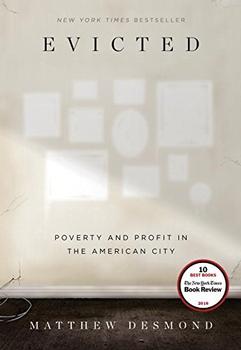Summary | Excerpt | Reviews | Beyond the Book | Readalikes | Genres & Themes | Author Bio

Critics' Opinion:
Readers' Opinion:
First Published:
Mar 2016, 432 pages
Paperback:
Feb 2017, 448 pages
 Book Reviewed by:
Book Reviewed by:
Poornima Apte
Buy This Book
An excerpt from Evicted: Poverty and Profit in the American City by Matthew Desmond
Jori and his cousin were cutting up, tossing snowballs at passing cars. From Jori's street corner on Milwaukee's near South Side, cars driving on Sixth Street passed squat duplexes with porch steps ending at a sidewalk edged in dandelions. Those heading north approached the Basilica of St. Josaphat, whose crowning dome looked to Jori like a giant overturned plunger. It was January of 2008, and the city was experiencing the snowiest winter on record. Every so often, a car turned off Sixth Street to navigate Arthur Avenue, hemmed in by the snow, and that's when the boys would take aim. Jori packed a tight one and let it fly. The car jerked to a stop, and a man jumped out. The boys ran inside and locked the door to the apartment where Jori lived with his mother, Arleen, and younger brother, Jafaris. The lock was cheap, and the man broke down the door with a few hard-heeled kicks. He left before anything else happened. When the landlord found out about the door, she decided to evict Arleen and her boys. They had been there eight months.
The day Arleen and her boys had to be out was cold. But if she waited any longer, the landlord would summon the sheriff, who would arrive with a gun, a team of boot-footed movers, and a folded judge's order saying that her house was no longer hers. She would be given two options: truck or curb. "Truck" would mean that her things would be loaded into an eighteen-footer and later checked into bonded storage. She could get everything back after paying $350. Arleen didn't have $350, so she would have opted for "curb," which would mean watching the movers pile everything onto the sidewalk. Her mattresses. A floor-model television. Her copy of Don't Be Afraid to Discipline. Her nice glass dining table and the lace tablecloth that fit just-so. Silk plants. Bibles. The meat cuts in the freezer. The shower curtain. Jafaris's asthma machine.
Arleen took her sons—Jori was thirteen, Jafaris was five—to a homeless shelter, which everyone called the Lodge so you could tell your kids, "We're staying at the Lodge tonight," like it was a motel. The two-story stucco building could have passed for one, except for all the Salvation Army signs. Arleen stayed in the 120-bed shelter until April, when she found a house on Nineteenth and Hampton, in the predominantly black inner city, on Milwaukee's North Side, not far from her childhood home. It had thick trim around the windows and doors and was once Kendal green, but the paint had faded and chipped so much over the years that the bare wood siding was now exposed, making the house look camouflaged. At one point someone had started repainting the house plain white but had given up mid-brushstroke, leaving more than half unfinished. There was often no water in the house, and Jori had to bucket out what was in the toilet. But Arleen loved that it was spacious and set apart from other houses. "It was quiet," she remembered. "And five-twenty-five for a whole house, two bedrooms upstairs and two bedrooms downstairs. It was my favorite place."
After a few weeks, the city found Arleen's favorite place "unfit for human habitation," removed her, nailed green boards over the windows and doors, and issued a fine to her landlord. Arleen moved Jori and Jafaris into a drab apartment complex deeper in the inner city, on Atkinson Avenue, which she soon learned was a haven for drug dealers. She feared for her boys, especially Jori—slack-shouldered, with pecan-brown skin and a beautiful smile—who would talk to anyone.
Arleen endured four summer months on Atkinson before moving into a bottom duplex unit on Thirteenth Street and Keefe, a mile away. She and the boys walked their things over. Arleen held her breath and tried the lights, smiling with relief when they came on. She could live off someone else's electricity bill for a while. There was a fist-sized hole in a living-room window, the front door had to be locked with an ugly wooden plank dropped into metal brackets, and the carpet was filthy and ground in. But the kitchen was spacious and the living room well lit. Arleen stuffed a piece of clothing into the window hole and hung ivory curtains.
Reprinted from Evicted: Poverty and Profit in the American City. Copyright © 2016 by Matthew Desmond. Published by Crown Publishers, an imprint of Penguin Random House LLC.





The House on Biscayne Bay
by Chanel Cleeton
As death stalks a gothic mansion in Miami, the lives of two women intertwine as the past and present collide.

The Flower Sisters
by Michelle Collins Anderson
From the new Fannie Flagg of the Ozarks, a richly-woven story of family, forgiveness, and reinvention.

The Funeral Cryer by Wenyan Lu
Debut novelist Wenyan Lu brings us this witty yet profound story about one woman's midlife reawakening in contemporary rural China.
Your guide toexceptional books
BookBrowse seeks out and recommends the best in contemporary fiction and nonfiction—books that not only engage and entertain but also deepen our understanding of ourselves and the world around us.